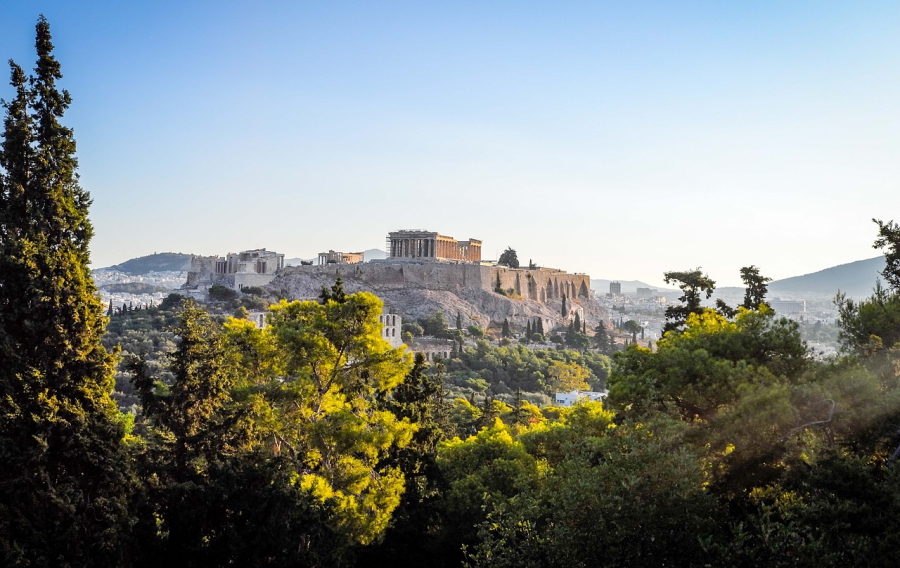- HOME
- Greek Music
Greek Music
Greek music is the sound of the bouzouki and tunes like Zorba the Greek and Never on Sunday are heard everywhere, while rembetika is called the blues of Greece.
Greece is one of the few countries in the world that has not succumbed totally to western pop music. Turn on a radio at random and you can almost guarantee that the first music you here will be distinctly Greek. It may be modern Greek pop music, but it will still have that unique sound born of the bouzouki (the mandolin-like Greek stringed instrument that epitomises Greek music), and the influences of the Middle East and Asia, with definite echoes of Indian music.
That's not to say that young Greeks are unaware of the latest rock bands and music trends. They definitely are. You will have no trouble finding modern international music played in indoor and outdoor discos, at rock concerts in summer, and in clubs where live jazz, blues and rock are just as good as they are in any other country.
Young Greeks, though, grow up with traditional Greek music in their blood - and certainly in their ears, for wherever you go in Greece you will hear Greek music: in tavernas and bars, on ferries, in buses, and escaping through the windows of houses and cars.
Every region, every island, has its own folk music, although not much of it is truly native as the imported oriental influences are ubiquitous. Everywhere you go you will come across official music and dance festivals (the two are virtually inseparable in Greece), as well as impromptu sessions when the chairs are pushed back and the mood of the music simply takes over. In Greece, any open space is potentially a dance floor.
Rembetika
Rembetika is the blues of Greece, with a blend of jazz. As with both those types of music, it is created from various influences yet combines them all to provide a style that is unique. No one is sure where the name came from, but the music came to Greece with the exchange of populations with Turkey that took place in 1923.
Greeks who had been living in Turkey - most of them born there - brought back with them the distinctive oriental music that was popular in cafés and bars. The people who returned were for the most part desperately poor, many of them forced to live in primitive conditions around Piraeus, the port of Athens. Here drinking dens grew up where musicians and singers would meet, their music expressing the poverty of their lives and their feelings of alienation. Out of this, the Greek blues was born and lives firmly on today.
Rembetika lives on, just like the blues in the USA, because it expresses heartfelt feelings that are both particular to a specific group of people and yet are universal at the same time. If you want an insight into the Greek soul, seek out one of the rembetika clubs in Athens and spend an evening there, watching and listening. Even if you don't understand the words, you will understand the sincere sentiments being expressed. be prepared for a late night, too. By the way, 'rembetiko' is the singular form of the word and 'rembetika' the plural, and you'll see both used.
Mikis Theodorakis
The most famous Greek musician of recent times is undoubtedly Mikis Theodorakis. He was born in 1925 and is best-known internationally for his soundtrack music for the 1965 Academy Award-winning movie Zorba the Greek. No one will get through a visit to Greece without hearing either the title track of Zorba or that of another famous Greek movie, Never on Sunday (1960), whose music also won an Academy Award for composer Manos Hadjidakis (1925-1994).
Theodorakis's music - at least in those days - was known as Entechno. This has nothing to do with modern Techno music but is a fusion of the folk and rembetika styles that produced a new type of music with a more contemporary feel but without losing the sounds of the past.
Theodorakis studied at the Paris Conservatoire, but became critical of the Greek classical music establishment - and of the Greek establishment generally. When the Colonels came to power in 1967, two years after Zorba's success had made Theodorakis a Greek musical hero, he was imprisoned and his music was banned for being subversive.
Iannis Xenakis
Greece produced another composer of international standing in Iannis Xenakis (1922-2001). Also an architect, he worked as assistant to the innovative French architect Le Corbusier (1887-1965) from 1948 until 1960. Xenakis's work also showed a corresponding interest in the mathematical and harmonious elements in music. He founded the School of Mathematical and Automatic Music in 1966. He sometimes worked with Greek themes, such as providing music for a production of the Oresteia, but Xenakis moved to France in the late 1940s, and became a French citizen in 1965.
Greek Musical Instruments
The music of Greece is unique and homegrown, both in style and in the instruments used, The following instruments form the backbone of the traditional Greek sound
The lyre - a relative of the harp, famous for accompanying Orpheus into Hades - has relinquished the lead role it enjoyed in antiquity. However, the lute, known on Crete as the lauoto, is still a Greek mainstay. Similar stringed instruments include the tamboura and the outi. In addition, you'll seldom see a band without a tambourine, called either a defi, dachares, or tsaboutsas, depending where you are in Greece.
Finally, the most ubiquitous instrument: the bouzouki. It's similar to a mandolin but has a lower pitch. One type has four twin pairs of strings like the mandolin, but there are also bouzoukis with just three sets of twin strings. This came to Greece from turkey and was used widely to play rembetika, but now it is seen as a traditional Greek instrument and you'll find someone who plays one in even the smallest of Greek villages, as common in Greece as a guitar is elsewhere. In fact you'll hardly ever see anyone playing a guitar in traditional Greek music get-togethers.
Don't miss our YouTube video of some live Cretan music, with Mike filming and Donna joining in the dancing.

Latest Posts
-
The Lesser-Known Traditions of Greek Easter
Step off the beaten path this spring and discover the enchanting — and often surprising — Easter traditions found across Greece. -
Easter in the Mystical Castle of Monemvasia
In the castle town of Monemvasia, with its dramatic medieval backdrop and sea views, Easter is a deeply spiritual and atmospheric experience. -
Sifnos: Greece’s Hidden Culinary Star on the Rise
Sifnos, a Cycladic island, is gaining fame for its rich culinary heritage, especially the beloved melopita honey-cheese tart. -
Easter in Leonidio: A Tapestry of Light, Culture and Cliffs
In Leonidio, Easter comes alive with handmade hot air balloons in the sky and lanterns made from bitter oranges in the streets. -
April 9 Strike in Greece to Impact Public Transport, Ferries and Air Travel
Transportation and travel across Greece will face disruptions on Wednesday, April 9, as public transport, ferry and aviation workers join a nationwide strike called by Greek labor unions. -
Ancient Theater of Lefkada Brought Fully to Light Following Systematic Excavation
The Greek Culture Ministry has announced that the first ancient theater ever identified in the Ionian Islands has recently been brought fully to light on Lefkada, revealing an impressive monument that… -
Seven Greek Traditions Recognized as Intangible Cultural Heritage
From traditional barrel-making to age-old folk dances, seven new entries on Greece’s National Inventory preserve the country’s living heritage for future generations. -
Greek Air Traffic Controllers to Hold 24-hour Strike, Disrupting Flights on April 9
The Hellenic Air Traffic Controllers Union have announced a 24-hour strike for Wednesday, April 9, in response to the protest called by the Civil Servants’ Confederation (ADEDY). The strike is being h… -
Ten Best Budget Hotels on Santorini
Greece Travel Secrets picks the ten best budget hotels on Santorini, some with caldera views, some near beaches and some close to the heart of Fira. -
No Ferries in Greece on April 9 as Seamen Join Nationwide Strike
The Pan-Hellenic Seamen’s Federation (PNO) has announced its participation in the 24-hour strike called by the General Confederation of Greek Labor (GSEE) on Wednesday, April 9. The strike, which will…































